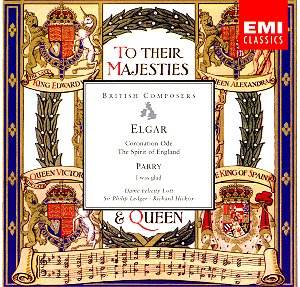How well I remember
hearing Elgar’s Coronation Ode
for the first time when EMI released
this recording way back in 1977. I remember
so well the terrific hair-raising sensation
created by ‘Land of Hope and Glory’
in this setting and how the magnificent
Kneller Hall brass seemed to reach right
out of the speakers. I defy anybody
to deny that this setting cannot likewise
move them. If I was to choose my favourite
tingle-factor pieces then this would
have to figure highly on the list. Why
this movement/this work does not figure
more often in last night Prom concerts
is a mystery to me. The Coronation
Ode was written for a gala concert
on the eve of Edward VII’s coronation
fixed for 26 June 1902. The King himself,
like thousands of his subjects, had
been thrilled by Elgar’s Pomp and
Circumstance March No.1 and had
suggested to the composer that words
should be fitted to its tune. Eventually
Land of Hope and Glory, as we
know it now, was evolved from this Coronation
Ode setting. The other patriotic
movements are in sympathy with the age
and should be accepted in that spirit.
They are entitled: ‘Crown the King’,
‘The Queen’; ‘Hark upon the Hallowed
Air…’; ‘Peace, gentle Peace…’; ‘Daughter
of Ancient Kings’; and ‘Britain, ask
of thyself’. All the soloists acquit
themselves very well and this performance
wins hands down over the rival Chandos
version.
On the other hand I
prefer the Chandos version of Elgar’s
Spirit of England (with the Coronation
Ode on Chandos CHAN 8430). Soprano,
Teresa Cahill has that much more gravitas
and the Chandos sound is stunning. The
Spirit of England has been described
by Jerrold Northrop Moore, Elgar’s biographer,
as the composer’s ‘sleeper’, an opinion
I concur with wholeheartedly. This is
an Elgar patriotic work written in the
darkest days of World War I. It comprises
settings of war verses by Laurence Binyon,
and is cast in three movements: ‘The
Fourth of August’; ‘To Women’ and ‘For
the Fallen’. The last section, composed
first in 1915, is by far the best known
and was for many years performed around
Armistice Day. It is a most moving valediction,
especially Elgar’s setting of those
words: "They shall not grow old.
As we that are left grow old …At the
going down of the sun and in the Morning,
We will remember them"; and of
the beautiful final verse – "As
the stars that shall be bright when
we are dust, Moving in marches upon
the heavenly plain, As the stars that
are starry in time of our darkness,
To the end, to the end, they remain."
Parry’s I was glad
must be one of the finest pieces of
ceremonial music ever written and another
tingle factor candidate. It was composed
for the coronation of Edward VII. The
ambience of the Chapel of Kings College
Cambridge and Ledger’s forces give this
performance a tremendous impact.
Rounding off the programme
is Elgar’s stirring arrangement of the
National Anthem and Elgar’s sublime
Offertory, O hearken thou.
Grand ceremonial music
that touches heart and spirit.
Ian Lace
From the Bulletin
Board
I've read Ian Lace's
review of this EMI Classics resissue
with great interest. I wholeheartedly
agree with his enthusiasm for Spirit
of England in particular. Having had
the good fortune to sing in a number
of performances of it (including three
in the last few weeks) I've no hesitation
in regarding it as top-drawer Elgar.
However, I'm not so sure I agree with
him that the rival Chandos performance
of this work is the best (it's recently
been reissued at budget price on CHAN
6574; the coupling is the Coronation
Ode.) I've been familiar with this recording,
conducted by Sir Alexander Gibson, since
it first came out on LP. The Chandos
sound is atmospheric and not an obvious
studio production in the way that the
Hickox account is (Gibson was recorded
in Paisley Abbey) but listeners should
be warned that the Paisley acoustic
is very resonant. To some extent the
resonance has been tamed on this latest
CD issue and more detail than ever before
is audible. Nonetheless, the EMI sound
is more sharply focused
However, two other factors make me
strongly prefer Hickox to Gibson. Firstly,
some of Gibson's tempi are extremely
broad (he takes 30'32" for the
piece, Hickox requires 27'04" without
ever souinding rushed). At one or two
points the music nearly becomes becalmed
in Gibson's hands. I don't think the
broad tempi are dictated by the acoustic
for the tempi in Coronation Ode, recorded
in the same venue, are fine.
The other serious problem I have with
the Gibson recording, I'm afraid, is
the singing of Teresa Cahill. She sings
with a very wide vibrato indeed and
this means that, to my ears at least,
not every note is hit truly in the centre.
Additionally, her diction is far from
clear. Dame Felicity Lott, for Hickox,
is much to be prefered on both counts.
I'd advise potential purchasers to
sample both versions of Spirit of England
before committing. As Ian says, the
Ledger performance of the Coronation
Ode is very fine. Finally you get more
music for your money with EMI. But how
nice to have a choice!
John Quinn
